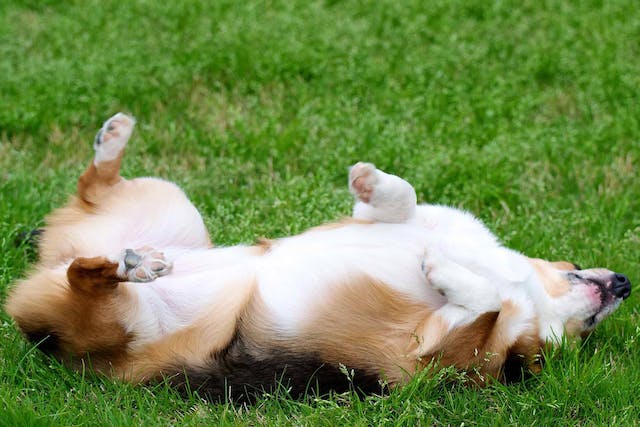Have you ever noticed your dog’s peculiar behavior of rolling on their treats before actually consuming them? It may seem bizarre at first, but this common canine habit has fascinated pet owners and experts alike. While dogs have a reputation for being playful and sometimes quirky, there is usually a reason behind their actions. So, Why Does My Dog Roll on His Treats? In this article, we will explore the possible explanations for this behavior and delve into the fascinating world of canine instincts.
The Big Reasons Why Does My Dog Roll on His Treats
Here are some of the reasons Why Does My Dog Roll on His Treats:
1.Instinctual Behavior
One of the primary reasons Why Does My Dog Roll on His Treats can be traced back to their ancestral instincts. Dogs are descendants of wolves, and although domesticated, they still retain many of their wild instincts. Rolling on treats could be a way for dogs to mimic the behavior of their ancestors, who would roll on their prey to mask their scent and protect their food from other predators. This action may serve as a natural instinct to claim ownership and safeguard their valuable resources.
 2. Scent Marking
2. Scent Marking
Another possible explanation for this behavior is scent marking. Dogs have an incredibly acute sense of smell, and rolling on their treats could be a way for them to enhance the scent and make it more appealing. By leaving their own scent on the treats, dogs may be asserting their ownership and ensuring that other animals do not mistake their food for their own. This behavior can also serve as a way for dogs to communicate their presence and dominance to other dogs in the vicinity.
3. Sensory Exploration
Dogs experience the world through their senses, and rolling on treats may provide them with a unique sensory experience. The texture, smell, and taste of the treats can be intriguing to dogs, and rolling on them may allow them to explore and engage with their food in a more tactile manner. This behavior could be a way for dogs to satisfy their natural curiosity and interact with their environment.
4. Individual Preferences
It is important to note that not all dogs exhibit this behavior, and individual preferences and personalities play a significant role. Some dogs may have learned to roll on their treats through observation or imitation of other dogs, while others may have developed it as a unique quirk. Each dog is unique, and their motivations for rolling on treats may vary.
Practical Recommendations for Managing Treat Rolling Behavior
Here are some of the recommendations for Why Does My Dog Roll on His Treats:
1. Provide Adequate Exercise and Mental Stimulation
Dogs are naturally active animals, and ensuring they receive sufficient exercise and mental stimulation can help redirect their energy away from rolling on treats excessively. Engage in regular play sessions, walks, and interactive games to keep your dog physically and mentally stimulated. Puzzle toys and food-dispensing toys can also provide mental challenges and keep them occupied.
2. Establish Clear Boundaries and Consistent Training
Consistency is key when it comes to training and setting boundaries for your dog. Teach them basic obedience commands such as “sit,” “stay,” and “leave it.” By establishing clear rules and reinforcing positive behaviors, you can help your dog understand what is expected of them and discourage possessiveness or aggression around treats.
3. Use Positive Reinforcement
Positive reinforcement is an effective training technique that involves rewarding desired behaviors. When your dog shows appropriate behavior around treats, such as not rolling on them excessively or displaying possessiveness, praise and reward them with treats, verbal praise, or affection. This positive reinforcement helps reinforce the desired behavior and encourages your dog to continue behaving appropriately.
4. Gradual Desensitization
If your dog exhibits possessive or aggressive behavior around treats, it may be necessary to work on desensitization. Start by offering your dog treats in a controlled environment where they feel comfortable. Gradually increase the level of distraction or proximity to other dogs or people while ensuring your dog remains calm and relaxed. This process helps them associate treats with positive experiences and reduces any negative associations.
5. Seek Professional Guidance
If you are struggling to manage your dog’s treat rolling behavior or if it becomes problematic, it is always beneficial to seek professional guidance. A certified dog trainer or behaviorist can assess your dog’s behavior, provide personalized advice, and guide you through effective training techniques to address the issue. They can also help identify any underlying factors contributing to the behavior and develop a tailored plan to manage it.
6. Provide Alternative Enrichment Activities
To redirect your dog’s focus away from treat rolling, offer alternative enrichment activities. Provide them with interactive toys, chew toys, or puzzle games that engage their senses and keep them mentally stimulated. This can help satisfy their natural instincts and provide a healthy outlet for their energy.
Remember, each dog is unique, and what works for one may not work for another. Be patient, consistent, and understanding as you work with your dog to manage their treat rolling behavior. With time, training, and love, you can help your furry friend develop appropriate behaviors and foster a harmonious relationship.

Why Does My Dog Roll on His Treats
Why Does My Dog Roll on His Treats – Conclusions
The behavior of dogs rolling on their treats can be intriguing and fascinating. It can be attributed to their ancestral instincts, scent marking behavior, sensory exploration, or simply individual preferences. Understanding the reasons behind Why Does My Dog Roll on His Treats can help us better understand our furry friends and their natural instincts.
If your dog exhibits this behavior, it is generally harmless and should not be a cause for concern. However, it is important to ensure that this behavior does not become possessive or aggressive. If your dog becomes overly protective of their treats or shows signs of aggression, it is advisable to seek guidance from a professional dog trainer or behaviorist.
Remember, each dog is unique, and their behaviors may vary. Embrace the quirks and peculiarities of your dog, and continue to provide them with love, care, and enriching experiences.









 2. Scent Marking
2. Scent Marking












